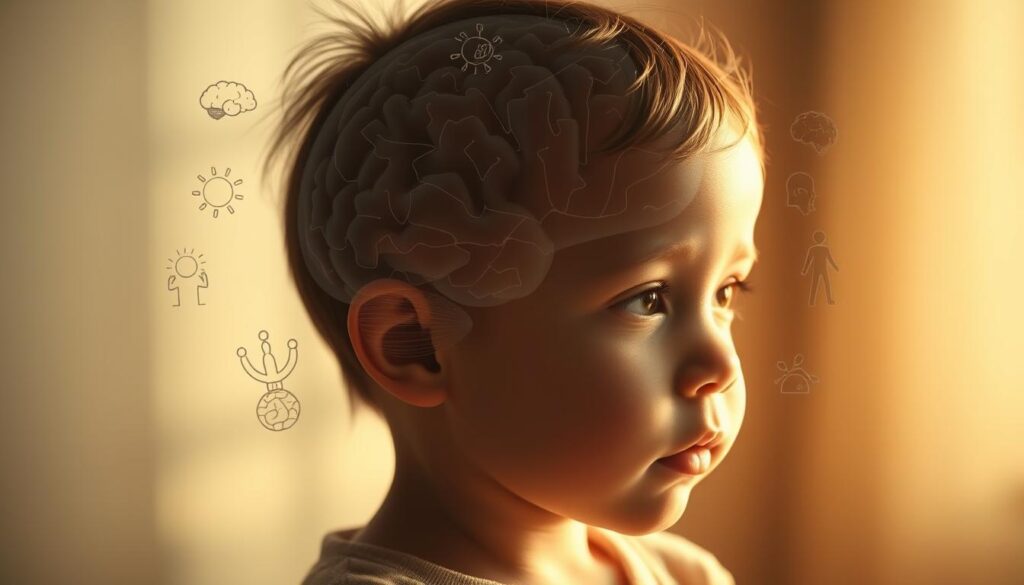Ever wonder how your child’s brain helps them learn and grow? It’s key to know about developmental milestones to help them grow. As a parent, knowing about child development stages helps your child and strengthens your bond.
The journey of brain development in children is special and complex. It’s filled with important milestones that need your help and support.
The Centers for Disease Control and Prevention (CDC) says it’s important to know these milestones. They offer tools like the Milestone Tracker App to help you. We’ll look at the basics of brain growth and share CDC data to get ready for the milestones and tips ahead.
- Understanding your child’s brain is key for good parenting.
- Child development stages are important for your child’s growth.
- Knowing about brain development in children helps you connect more.
- The CDC has great resources to track developmental milestones.
- Your help is very important in navigating these milestones.
The Importance of Understanding Child Development
Knowing about child development is key to your child’s growth. It’s more than just watching for milestones. This knowledge helps you make a better world for them.
Studies show early brain growth is very important. It sets the stage for learning and feeling good later on. You are a big part of this journey. Your actions help shape your child’s mind and heart.
With the right parenting tips, you can help your child learn and grow. Being involved in their growth makes learning better and strengthens your bond. It helps you meet their changing needs, which is good for their health.
Understanding kids’ behavior is important as a parent. This helps you create a supportive environment. You help build their strength and confidence. You are more than just a caregiver; you help unlock your child’s full ability.
Brain Development in Children: A Quick Overview
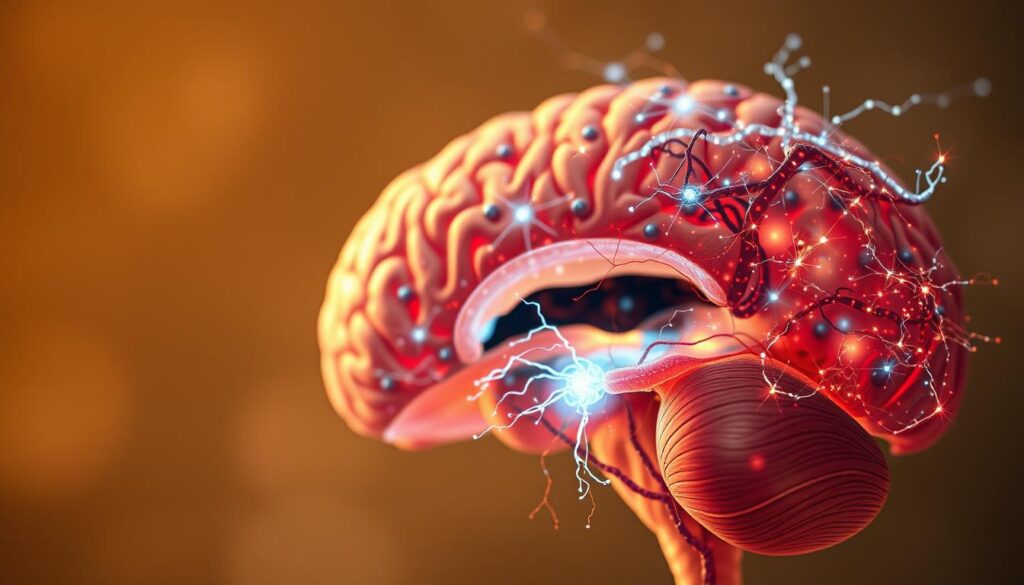
The early years of your child’s life are very important for child brain development. In these years, about 90% of brain growth happens. This sets the base for their thinking skills for life.
Playing and talking with your child helps a lot. It shapes their neurological development in kids. It also helps build strong thinking and learning skills.
Knowing how the brain grows is key. It starts with making connections between brain cells. In the early years, kids make lots of these connections. But, not all stay.
As the brain grows, it gets rid of some connections. This makes it better at handling experiences and learning.
To help your child’s brain grow, do “serve and return” activities. This means answering their sounds and gestures with more sounds and play. It builds strong brain connections that help with learning and solving problems.
Understanding Your Child’s Brain: Navigating Developmental Milestones
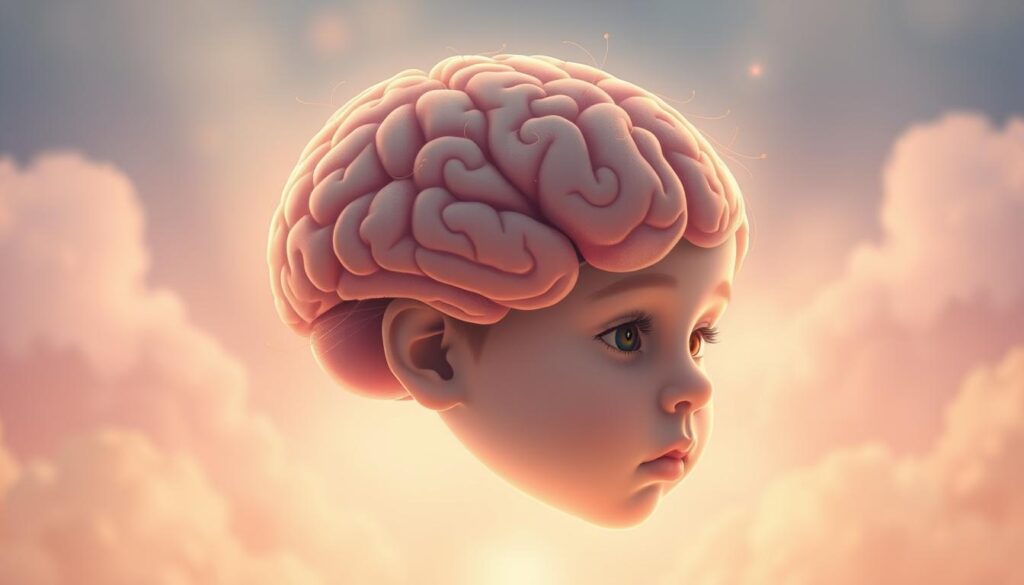
It’s important to know the key milestones in your child’s growth. These help you see how they’re doing at different ages. From learning to walk to showing feelings, these signs show they’re getting better.
Watching your child’s brain grow helps you connect with them better. The CDC has tools to check how your child is doing. Knowing what to expect lets you celebrate their wins and help with tough times.
Helping your child grow means knowing what to expect and how to support them. Every child is different, and their path may vary. But, being there for them helps them succeed.
Key Developmental Stages and How to Parent Them
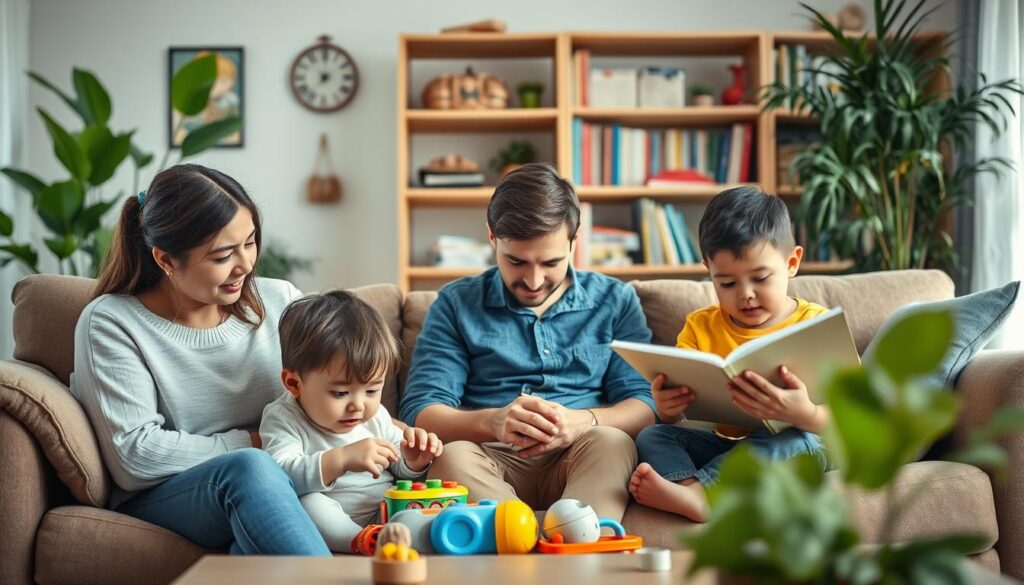
Every stage of growth, from babyhood to early childhood, has its own ups and downs. Knowing these milestones can make parenting better. Each phase needs a special way to meet your child’s unique needs.
When your child is a toddler, it’s key to help them feel independent yet safe. Let them explore but keep it safe. Activities that help with fine motor skills and talking are important.
Playing simple games like stacking blocks or drawing helps a lot. It lets your child learn and grow through fun.
As your child grows, change how you parent to match their new skills and interests. Always be positive to boost their self-confidence. Letting them choose simple things helps them feel more in control.
Knowing what each stage needs helps you meet your child’s needs better. This care supports their emotional and thinking growth. It helps them love learning for life.
The Power of Perspective
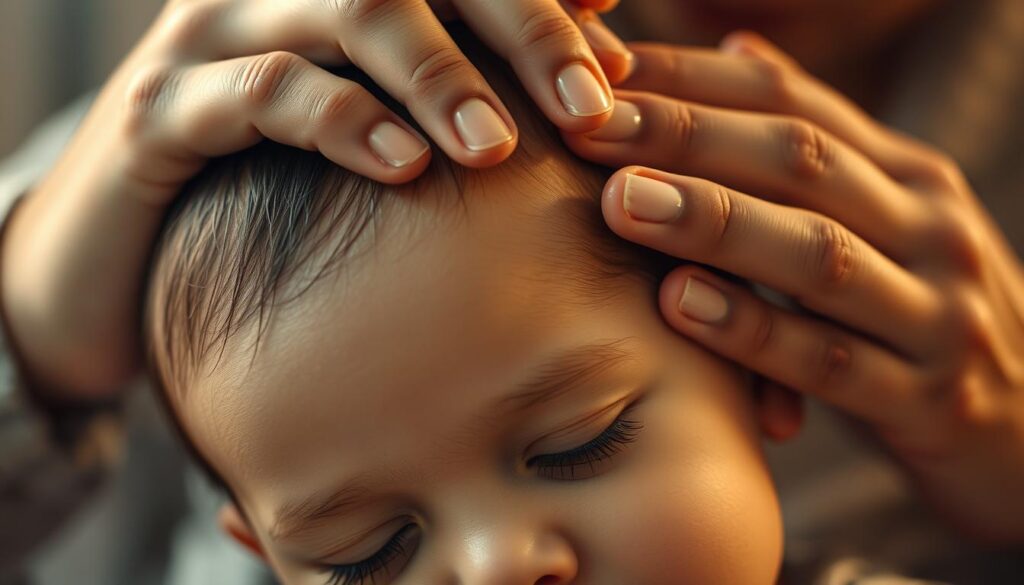
Seeing your child’s journey as unique is key to good parenting. A positive view helps them grow strong and emotionally smart. It’s important to know kids feel many emotions.
This lets you make a safe space for their brain to grow. It’s all about nurturing their mind.
Changing how you see things helps you get your child better. Seeing the good in tough times teaches them to cope well. They learn to face life’s ups and downs with courage.
Learning to see both the hard and the good in your child’s growth makes you a better parent. This way, you reduce your stress and help your child feel safe. This positive view can make your bond with your child stronger.
Emotional Development in Children

Child emotional development is key to how kids interact and handle their feelings. It’s important to know when kids reach emotional milestones. For example, by two, kids show more feelings like joy, sadness, and anger.
Helping your child feel understood is very important. When you validate their feelings, they learn to express them better. Talking about feelings during play is a great way to teach them. You can ask how they feel about a game, helping them share their emotions.
Teaching empathy early is also key. Stories and role-play help kids understand others and see things from their point of view. This helps them make friends and get along better with others.
The Importance of Play in Cognitive Development
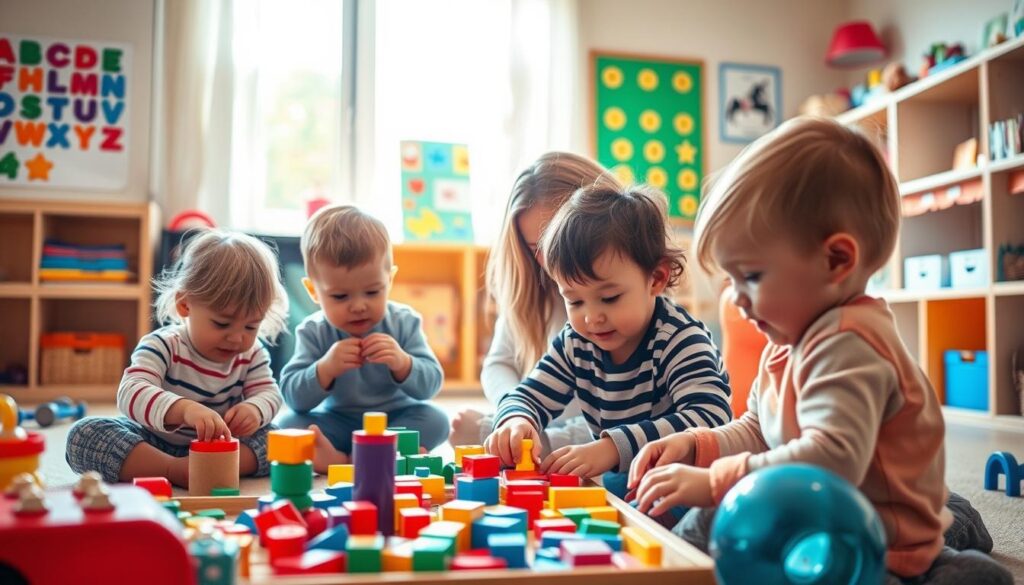
Play is key for kids’ brains to grow. It lets them explore and learn. They get better at solving problems and thinking critically.
Play helps kids learn important social skills. They figure out how to get along with others. This is good for their feelings and how they work with others.
Make sure your child plays in many ways. This helps their brain grow. Activities like building with blocks or playing games are great. They help kids get ready for school and learning all their lives.
Parental Involvement: Nurturing Your Child’s Brain
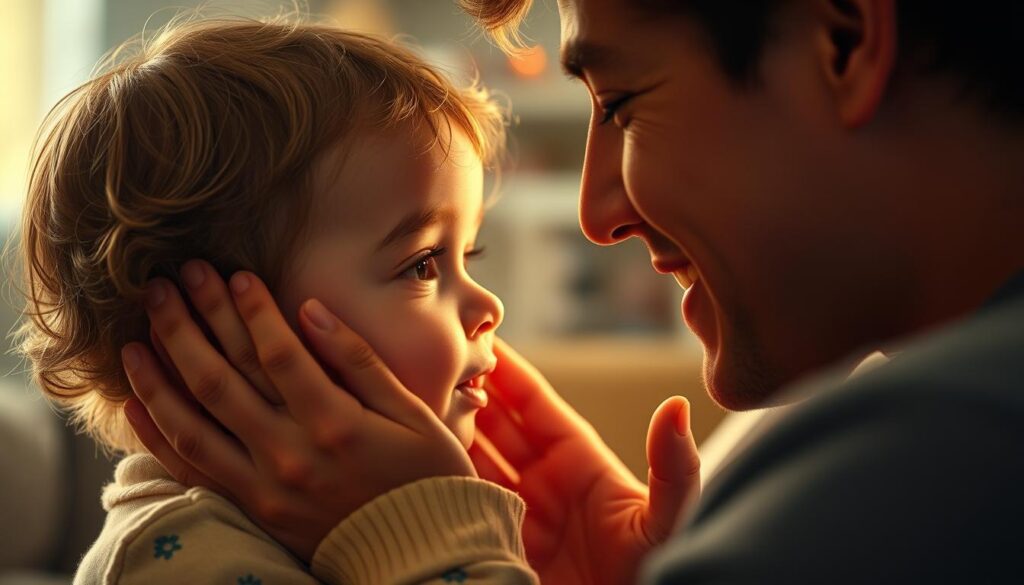
Being involved with your child is very important. It helps their brain grow and stay healthy. When you spend time together, it makes a safe place for learning.
Talking, sharing, and playing together is key. These activities keep their brain active and help it grow. Here are some ways to get involved:
- Have conversations that let your child share their thoughts.
- Play games that help solve problems and be creative.
- Read together to improve vocabulary and understanding.
- Listen carefully to show your child their opinions are important.
Building trust and motivation is what you do. Your role is more than just watching over them. It helps their brain and heart grow strong.
Coping with Stress: Toxic Stress vs. Positive Stress

It’s important to know the difference between toxic stress and positive stress. Positive stress helps kids learn and grow. It makes them strong and ready for challenges. But, toxic stress comes from bad experiences like neglect or abuse. It can hurt a child’s brain and development.
Spotting toxic stress signs is key. Look for changes in behavior, feeling left out, or being very anxious. Helping your child feel safe and talking openly can lessen stress effects.
- Foster a nurturing environment with consistent routines.
- Encourage your child to express feelings openly and understand their emotions.
- Teach coping mechanisms, such as mindfulness or breathing exercises.
Knowing the difference between toxic stress vs. positive stress helps you support your child. Teaching them how to handle stress now helps them grow emotionally and stay well.
Recognizing When Help is Needed
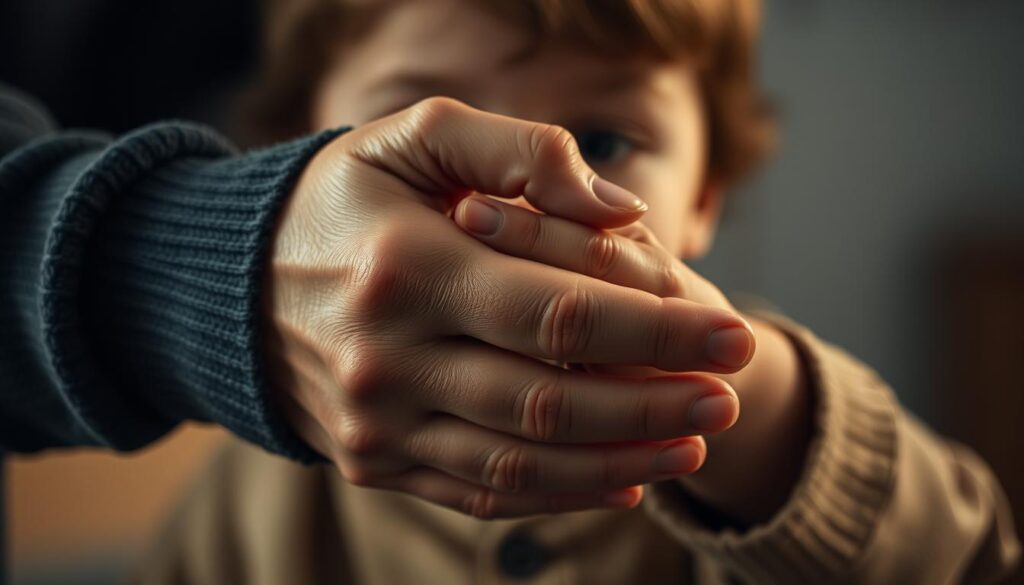
As a parent, you watch your child grow and learn. You know the important steps they should take. If they miss these steps, it’s time to get help.
There are signs that show your child might need extra help:
- If your child struggles to communicate or express their needs effectively.
- When you notice difficulties in social interactions with peers.
- If there are significant delays in motor skills, such as walking or fine motor tasks.
- When emotional responses appear disconnected or inappropriate for their age.
Getting help early can really help your child. Use local educational services for screenings and evaluations. This way, you can support your child’s growth.
Understanding your child’s brain is a journey of discovery and growth. Every child is different. This means you can tailor your parenting to meet their needs and help them grow.
Childhood milestones show us how their brain and emotions are developing. By staying involved and informed, you help them grow in many ways. These early years are very important and shape their future.
Think about how you help shape your child’s experiences. By being involved, you give them the tools they need for life. Parenting is tough, but with your effort, you make a big difference in their life.

